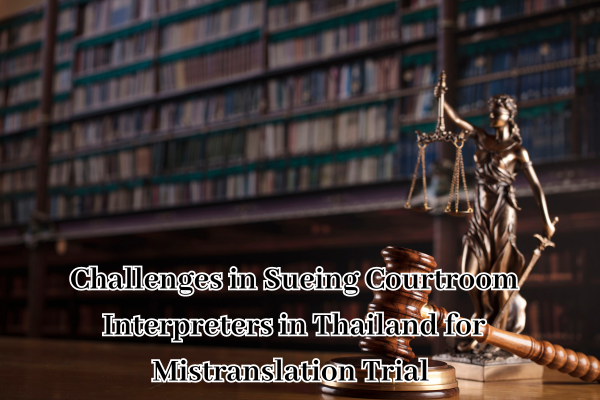
Challenges in Sueing Courtroom Interpreters in Thailand for Mistranslation Trial
After examining witnesses, the court will have all parties review the testimony to double-check for errors, missing information, and anything else that needs to be added. If all parties are dissatisfied with the translation, do not sign names to the testimony. If signed, it will be more challenging to protest the interpreter's translation afterward, particularly in non-essential mistranslations. Here are some of the key reasons why it is difficult to take legal action against interpreters in court, even if a mistranslation occurred in the trial room.
The main reason is that it is difficult to sue interpreters in court.
- Law: Thai law does not directly stipulate penalties for court interpreters who misinterpret. Each organization responsible for interpreters must have its disciplinary guidelines for interpreters. For SEAProTI interpreters, if there is an offense such as misinterpreting and being sued, they will be suspended from work until a verdict is reached. And if there is a verdict of guilt and the case is final, the interpreter's license will be revoked for life, etc. In addition, the case must be filed in another case, such as suing the interpreter for perjury. This is what the police often do with interpreters who misinterpret and ruin the case.
- Consent: When the examination of witnesses is completed, if all parties are not satisfied with the translation, it must be signed. It is considered consent to the translation. It's hard to object later, except in cases where the translation is so distorted that it changes the essence of the case.
- Proof: It is difficult to prove the interpreter's intent or not. A mistake, misunderstanding, or insufficient language knowledge may cause it.
If the interpreter is found to have made a serious misinterpretation affecting the essence of the case, you may consider the following methods:
- Take legal action: File a lawsuit against the interpreter in civil court to claim damages
- Petition: Complain to the agency that regulates interpreters, such as interpreter registration associations or various government agencies that provide interpreters.
- Appeal: Submit a petition to the Supreme Court to request a new trial
How to prevent problems
- Follow-up: Observe the interpreter's translation closely. Notify the court if any errors are found. This method is the best. You should not rely on just one interpreter. Have the user inform a lawyer or ask the court if he would like to bring an interpreter to check the translation of the other interpreter.
- Find your interpreter: Find a qualified interpreter who is an Expert in language, law, and culture.
- Examine: Check the interpreter's qualifications, experience, and past work, or ask to see the certificate license to perform interpreter duties for various agencies.
- Record every translation: In court, audio or video recording is prohibited. Therefore, the best way to record is to take notes. You may need to hire an interpreter to help write down or counter if there are mistranslations.
Precautions:
- Interpreters used in court may be lawyers, which customers often rely on, whether translated correctly or incorrectly, to benefit one's case. Selecting an interpreter who has received certification from a reputable agency or association is always advisable because the skills of a lawyer and an interpreter are not the same.
- Government interpreters can misinterpret, so find your interpreter. It is only the best solution to the problem.
Final summary:
Suing a court interpreter for mistranslation is not easy. But it is not challenging to prosecute. However, hiring a skilled interpreter can avoid issues. Follow the translation closely. and record evidence
Note: This information does not constitute legal advice. If the interpreter's translation is incorrect, you should consult an attorney for further advice.
เหตุใด เราจึงฟ้องล่ามแปลในศาลได้ยาก แม้จะมีการแปลผิดในห้องจารณาคดีจริง
หลังจากสืบพยานเสร็จ ศาลจะให้ทุกฝ่ายตรวจสอบคำเบิกความเพื่อตรวจสอบอีกครั้งว่า มีการแปลผิดหรือไม่ หรือมีอะไรตกไป และอยากจะเพิ่มเติมอะไรอีกบ้าง หากทุกฝ่ายไม่ติดใจในคำแปล ก็ให้ลงลายมือชื่อ ซึ่งนั่นก็หมายความว่า หากลงลายมือชื่อแล้ว ก็จะค้านคำแปลของล่ามภายหลังได้ยากขึ้นโดยเฉพาะคำแปลผิดที่ไม่ใช่สาระสำคัญ ต่อไปนี้เป็นแนวเหตุผลหลัก ๆ ว่า ทำไมเราจึงฟ้องล่ามแปลในศาลได้ยาก แม้จะมีการแปลผิดในห้องจารณาคดีจริง
เหตุผลหลักที่มีการฟ้องล่ามแปลในศาลได้ยาก
- กฎหมาย: กฎหมายไทยไม่ได้กำหนดบทลงโทษสำหรับล่ามศาลที่แปลผิดโดยตรง เพียงแต่ละองค์กรที่รับผิดชอบล่ามจะต้องแนวทางทางวินัยลงโทษล่ามของตัวเอง สำหรับล่ามของ SEAProTI หากมีการกระทำผิด เช่น แปลผิดจนโดนฟ้องจะถูกพักงานจนกว่าจะมีคำพิพากษา และหากมีคำพิพากษาว่าผิดและคดีถึงที่สุด ล่ามจพถูกเพิกถอนใบอนุญาตตลอดชีพ เป็นต้น และนอกจากนี้ ให้ฟ้องเป็นคดีอื่นไป เช่น การฟ้องล่ามว่าเบิกความเท็จ ซึ่งตำรวจมักทำแบบนี้กันบ่อย ๆ กับล่ามที่แปลผิดจนเสียรูปคดี
- การยินยอม: เมื่อสืบพยานเสร็จ หากทุกฝ่ายไม่ติดใจในคำแปล จะต้องลงลายมือชื่อ ถือเป็นการยินยอมในคำแปลนั้น ยากที่จะค้านภายหลัง ยกเว้นกรณีแปลผิดเพี้ยนจนเปลี่ยนสาระสำคัญของคดี
- การพิสูจน์: ยากที่จะพิสูจน์เจตนาว่าล่ามแปลผิดโดยเจตนาหรือไม่ อาจเกิดจากความผิดพลาด ความเข้าใจผิด หรือความรู้ภาษาไม่เพียงพอ
หากพบว่าล่ามแปลผิดอย่างร้ายแรง ส่งผลต่อสาระสำคัญของคดี อาจพิจารณาวิธีดังนี้
- ฟ้องร้อง: ฟ้องร้องล่ามต่อศาลแพ่ง เพื่อเรียกค่าเสียหาย
- ร้องเรียน: ร้องเรียนต่อหน่วยงานที่กำกับดูแลล่าม เช่น สมาคมที่รับจดทะเบียนล่าม หรือหน่วยงานราชการต่าง ๆ ที่จัดหาล่ามให้
- ฎีกา: ยื่นฎีกาต่อศาลฎีกา เพื่อขอให้พิจารณาคดีใหม่
วิธีป้องกันปัญหา
- ติดตาม: สังเกตการแปลของล่ามอย่างใกล้ชิด แจ้งให้ศาลทราบหากพบข้อผิดพลาด โดยวิธีการนี้ ให้ผู้ใช้แจ้งทนายความหรือขอศาล ว่าขอนำล่ามมาตรวจสอบคำแปลของล่ามอีกฝ่าย วิธีนี้เป็นวิธีที่ดีที่สุด และไม่ควรเชื่อใจล่ามฝ่ายใดฝ่ายหนึ่งเพียงฝ่ายเดียว
- หาล่ามเอง: เลือกหาล่ามที่มีคุณสมบัติเหมาะสม เชี่ยวชาญภาษา กฎหมาย และวัฒนธรรม
- ตรวจสอบ: ตรวจสอบคุณสมบัติ ประสบการณ์ และผลงานที่ผ่านมาของล่าม หรือขอดูใบรับรอง ใบอนุญาตในการปฏิบัติหน้าที่ล่ามของหน่วยงานต่าง ๆ
- บันทึก: ในศาลห้ามมีการบันทึกเสียง บันทึกภาพ ดังนั้น การบันทึกที่ดีที่สุดคือการจด อาจต้องจ้างล่ามมาช่วยจดหรือคอยค้านด้วยหากมีการแปลผิด
ข้อควรระวัง:
- ล่ามที่ใช้ในศาลอาจเป็นทนาย ซึ่งลูกความมักเชื่อว่า จะแปลให้ผิดหรือถูกอย่างไรก็เพื่อประโยชน์แห่งคดีของตน ซึ่งทักษะของทนายความ กับทักษะของล่ามไม่เหมือนกัน ดังนั้น เลือกล่ามที่ได้รับการรับรองจากหน่วยงานที่น่าเชื่อถือได้เสมอ
- ล่ามของหน่วยงานราชการก็แปลผิดได้ ดังนั้น ให้หาล่ามมาเอง เป็นวิธีการแก้ไขปัญหาที่ดีที่สุดเท่านั้น
สรุปส่งท้าย:
- การฟ้องล่ามศาลแปลผิดนั้นทำได้ยาก แต่ก็ไม่ใช่เรื่องยากที่จะดำเนินคดี แต่สามารถป้องกันปัญหาได้โดยการหาล่ามที่มีคุณสมบัติเหมาะสม ติดตามการแปลอย่างใกล้ชิด และบันทึกหลักฐานไว้
หมายเหตุ: ข้อมูลนี้ไม่ได้เป็นคำแนะนำทางกฎหมาย กรณีมีปัญหาเกี่ยวกับการแปลของล่าม ควรปรึกษาทนายความเพื่อรับคำแนะนำเพิ่มเติม
หากต้องการนักแปลเอกสารด้านกฎหมาย ติดต่อ cs.seaproti@gmail.com หรือโทร +66 2 114 3128 หรือเข้าชมเว็บไซต์ได้ที่ https://seaproti.com/
---
เกี่ยวกับสมาคมวิชาชีพนักแปลและล่ามแห่งเอเชียตะวันออกเฉียงใต้ (Southeast Asian Association of Professional Translators and Interpreters - SEAProTI)
- สมาคมวิชาชีพนักแปลและล่ามแห่งเอเชียตะวันออกเฉียงใต้ เป็นสมาคมวิชาชีพ ตั้งอยู่ที่ 33 อาคารบ้านราชครูห้อง 402 ซ.พหลโยธิน 5 ถ.พหลโยธิน แขวงพญาไท เขตพญาไท กรุงเทพฯ 10400 จดทะเบียนเลขที่ 6037/2564 กับกรมการปกครอง กระทรวงมหาดไทย และประกาศในราชกิจจานุกเบกษา อันเป็นที่ยอมรับของรัฐบาลและหน่วยงานราชการไทย เมือปี 2564
- "นักแปลรับรอง (Certified Translaors)" และ "ล่ามรับรอง (Certified Interpreters)" ของสมาคมวิชาชีพนักแปลและล่ามแห่งเอเชียตะวันออกเฉียงใต้ จดแจ้งเป็นนักแปลรับรองและล่ามรับรอง ตามข้อบังคับ ข้อที่ 9 ว่าด้วย นักแปลรับรอง ผู้รับรองการแปล และล่ามรับรอง โดยเป็น "ผู้มีใบอนุญาตให้ประกอบวิชาชีพนักแปลรับรอง ผู้รับรองการแปล และล่ามรับรอง ในนามสมาคมวิชาชีพนักแปลและล่ามแห่งเอเชียตะวันออกเฉียงใต้"
- อาศัยความตามข้อที่ 46.1 และ 46.3 ของข้อที่ 46 หมวดที่ 9 ในข้อบังคับสมาคมวิชาชีพ ตามที่ประกาศในราชกิจจานุเบกษา หน้า 227 เล่ม 138 ตอนที่ 83 ง ลงวันที่ 4 พฤศจิกายน พุทธศักราช 2564 แห่งราชอาณาจักรไทย นั้น นักแปลรับรองและผู้รับรองการแปลต้องกระทำการแปลและรับรองการแปล ตามแนวทางปฏิบัติที่กำหนดในข้อที่ 47.1 และ 47.2 ของข้อที่ 47 หมวดที่ 10 ว่าด้วย ตราประทับนักแปล และข้อที่ 48 ว่าด้วย การรับรองการแปล